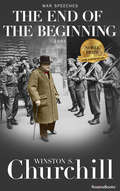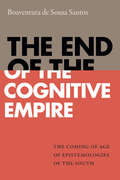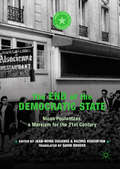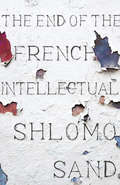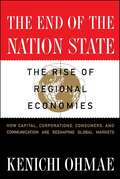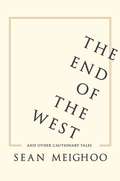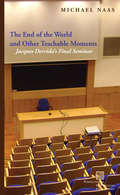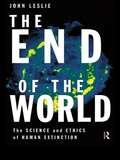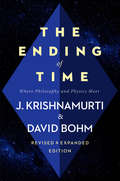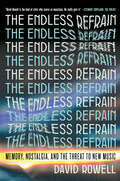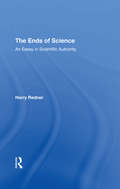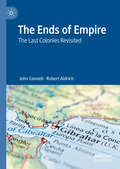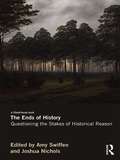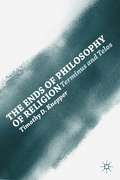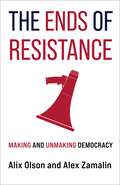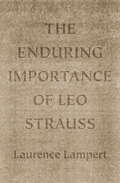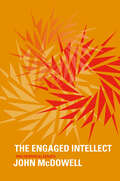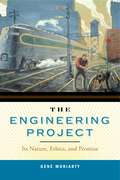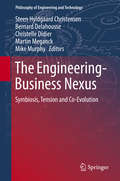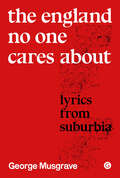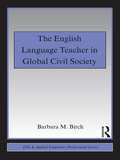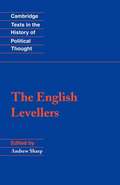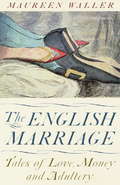- Table View
- List View
The End of the Beginning: 1943 (Winston S. Churchill War Speeches)
by Winston S. ChurchillThis collection of WWII speeches by the Nobel Prize-winning Prime Minister reflect his determination in the face of a fearsome enemy. 1942 was an important turning point in World War II. Britain and its allies had faced considerable challenges thus far. Beset by bombings and devastated by personal loss and the restrictions of war, the British public was losing patience with the war effort—and their prime minister. This collection of Winston Churchill&’s wartime speeches from 1942 provides an enlightening commentary on this volatile time in history from the point of view of one of its most prominent leaders. Churchill faced an uphill battle in his military efforts as well as in gathering political and public support for the struggle to come. But the tides had turned when the United States joined the war at the end of 1941. Churchill has been quoted as saying he felt certain of the Allied victory with the US on his side—and his speeches reflect this renewed sense of hope and conviction.
The End of the Cognitive Empire: The Coming of Age of Epistemologies of the South
by Boaventura De SantosIn The End of the Cognitive Empire Boaventura de Sousa Santos further develops his concept of the "epistemologies of the South," in which he outlines a theoretical, methodological, and pedagogical framework for challenging the dominance of Eurocentric thought. As a collection of knowledges born of and anchored in the experiences of marginalized peoples who actively resist capitalism, colonialism, and patriarchy, epistemologies of the South represent those forms of knowledge that are generally discredited, erased, and ignored by dominant cultures of the global North. Noting the declining efficacy of established social and political solutions to combat inequality and discrimination, Santos suggests that global justice can only come about through an epistemological shift that guarantees cognitive justice. Such a shift would create new, alternative strategies for political mobilization and activism and give oppressed social groups the means through which to represent the world as their own and in their own terms.
The End of the Democratic State: Nicos Poulantzas, a Marxism for the 21st Century (Marx, Engels, and Marxisms)
by Razmig Keucheyan David Broder Jean-Numa DucangeThis edited volume takes a close look at Nicos Poulantzas’s thought as a means of understanding the dynamics of the capitalist, neoliberal state in the 21st century. Nicos Poulantzas has left us with one of the most sophisticated theories of the state in the second half of the 20th century. Poulantzas’s influential theory draws inspiration from Marx, Lenin, Weber, and Foucault, among other thinkers, conceiving of the relationship between capitalism and the state as particularly original. This book aims to use Poulantzas’s theory of the capitalist state in order to understand important political and economic trends that have taken place since Poulantzas’s death in 1979. By entering into a dialogue with current Marxist and critical research in diverse fields such as political science, philosophy, sociology, history, and geography, this volume purports to evaluate the actuality of Poulantzas’s thought.
The End of the French Intellectual: From Zola to Houellebecq
by Shlomo SandCharting the decline of the French intellectual, from the Dreyfus Affair to IslamophobiaThe best-selling author of The Invention of the Jewish People, Shlomo Sand examines the troublesome figure of the French intellectual. Revered throughout the Francophile world, France’s tradition of public intellectual engagement stems from Voltaire and Zola and runs through Sartre and Foucault to the present day. The intellectual enjoys a status as the ethical lodestar of his nation’s life, but, as Sand shows, the recent history of these esteemed figures shows how often, and how profoundly, they have fallen short of the ideal. Sand examines Sartre and de Beauvoir’s unsettling accommodations during the Nazi occupation and then shows how Muslims have replaced Jews as the nation’s scapegoats for a new generation of public intellectuals, including Michel Houellebecq and Alain Finkielkraut. Possessing an intimate knowledge of the Parisian intellectual milieu, Sand laments the degradation of a literary elite, but questions the value of that class at the best of times. Drawing parallels between the Dreyfus Affair and Charlie Hebdo, while mixing reminiscence with analysis, Sand casts a characteristically candid and mordant gaze upon the intellectual scene of today.
The End of the Nation State: The Rise of Regional Economies
by Kenichi OhmaeArguing that nation states are forfeiting their role in the global economy, the author contends that other forces have usurped economic power--capital, corporations, customers, communications, and currencies--and that natural economic zones or region states are emerging.
The End of the West and Other Cautionary Tales
by Sean MeighooMost historical accounts take it for granted that the guiding principles of the Western tradition-reason, progress, and freedom-have been passed down directly from ancient Greece to modern Western society. Today, many commentators maintain that the Western tradition is fast approaching its end as it becomes more and more integrated with non-Western cultures. But what if we are witnessing something else entirely-not the end of the West but rather another historical mutation of the idea of the West?This groundbreaking critique shows that whether the West is hailed as the source of all historical progress or scorned as the root of all cultural imperialism, it remains a deeply problematic concept that is intrinsically connected to an ethnocentric view of the world. Reading the work of the continental philosophers Husserl, Heidegger, Levinas, and Derrida, as well as the postcolonial thinkers Said, Mohanty, Bhabha, and Trinh, Sean Meighoo strikes at the intellectual foundations of Western exceptionalism until its ideological supports show through. Deconstructing the concept of the West in his provocative interpretations of Martin Bernal's controversial work Black Athena and the Beatles' second film, Help!, Meighoo poses a formidable question to philosophers, writers, political scientists, and cultural critics alike: Can we mount an effective critique of Western ethnocentrism without reinforcing the idea of the West itself?
The End of the West and Other Cautionary Tales
by Sean MeighooMost historical accounts of "the West" take it for granted that the guiding principles of the Western tradition—reason, progress, and freedom—have been passed down directly from ancient Greece to modern Europe, evolving in isolation from all non-Western cultures. Today, many political analysts and cultural critics maintain that the Western tradition is fast approaching its end, for better or worse, as it becomes more and more integrated with non-Western cultures in an increasingly globalized world. But what if we are witnessing something else entirely—not the "end" of the West but rather another historical mutation of the idea of the West itself?This groundbreaking work shows that whether the West is hailed as the source of all historical progress or scorned as the root of all cultural imperialism, it remains a deeply problematic concept that is intrinsically connected to an ethnocentric view of the world. In a critical reading of the continental philosophers Husserl, Heidegger, Levinas, and Derrida as well as the postcolonial thinkers Said, Mohanty, Bhabha, and Trinh, Sean Meighoo strikes at the intellectual foundations of Western exceptionalism until its ideological supports show through. Deconstructing the concept of the West in his provocative interpretations of Martin Bernal's controversial publication Black Athena and the Beatles' second film Help!, Meighoo poses a formidable question to philosophers, writers, political analysts, and cultural critics alike: Can we mount an effective critique of Western ethnocentrism without reinforcing the very idea of the West?
The End of the World and Other Teachable Moments: Jacques Derrida's Final Seminar (Perspectives in Continental Philosophy)
by Michael NaasThe End of the World and Other Teachable Moments follows the remarkable itinerary of Jacques Derrida’s final seminar, “The Beast and the Sovereign” (2001–3), as the explicit themes of the seminar—namely, sovereignty and the question of the animal—come to be supplemented and interrupted by questions of death, mourning, survival, the archive, and, especially, the end of the world.The book begins with Derrida’s analyses, in the first year of the seminar, of the question of the animal in the context of his other published works on the same subject. It then follows Derrida through the second year of the seminar, presented in Paris from December 2002 to March 2003, as a very different tone begins to make itself heard, one that wavers between melancholy and an extraordinary lucidity with regard to the end. Focusing the entire year on just two works, Daniel Defoe’s Robinson Crusoe and Martin Heidegger’s seminar of 1929–30, “The Fundamental Concepts of Metaphysics,” the seminar comes to be dominated by questions of the end of the world and of an originary violence that at once gives rise to and effaces all things.The End of the World and Other Teachable Moments follows Derrida as he responds from week to week to these emerging questions, as well as to important events unfolding around him, both world events—the aftermath of 9/11, the American invasion of Iraq—and more personal ones, from the death of Maurice Blanchot to intimations of his own death less than two years away. All this, the book concludes, makes this final seminar an absolutely unique work in Derrida’s corpus, one that both speaks of death as the end of the world and itself now testifies to that end—just one, though hardly the least, of its many teachable moments.
The End of the World: The Science and Ethics of Human Extinction
by John LeslieAre we in imminent danger of extinction? Yes, we probably are, argues John Leslie in his chilling account of the dangers facing the human race as we approach the second millenium. The End of the World is a sobering assessment of the many disasters that scientists have predicted and speculated on as leading to apocalypse. In the first comprehensive survey, potential catastrophes - ranging from deadly diseases to high-energy physics experiments - are explored to help us understand the risks. One of the greatest threats facing humankind, however, is the insurmountable fact that we are a relatively young species, a risk which is at the heart of the 'Doomsday Argument'. This argument, if correct, makes the dangers we face more serious than we could have ever imagined. This more than anything makes the arrogance and ignorance of politicians, and indeed philosophers, so disturbing as they continue to ignore the manifest dangers facing future generations.
The Ending of Time
by Jiddu KrishnamurtiSpirituality meets science as two of the greatest minds of our time come together to discuss essential issues of good and evil, thought and consciousness, and the nature of existence.The Ending of Time presents the fascinating conversations between two men from vastly different worlds: revered philosopher Jiddu Krishnamurti and renowned physicist David Bohm. Through deep exploration of the brain vs. the mind, the significance of death, and an individual's relationship to society, they debate the root of human conflict and what we can do about it. Revolutionary insights throughout these discussions reveal the potential for the ending of time to bring about a new beginning for humanity. wrong turn humanity has taken--a state that they argue can be corrected. Though they insist that mankind can change fundamentally, they warn that transformation requires going from one's narrow and particular interests toward the general, and ultimately moving still deeper into that purity of compassion, love and intelligence that originates beyond thought, time, and even emptiness.This updated edition, edited and revised in clear and engaging language, includes a new introduction and a conversation previously published separately which examines "The Future of Humanity."
The Endless Refrain: Memory, Nostalgia, and the Threat to New Music
by David RowellA veteran music journalist argues that the rise of music streaming and the consolidation of digital platforms is decimating the musical landscape, with dire consequences for the future of our culture …In The Endless Refrain, former Washington Post writer and editor David Rowell lays out how commercial and cultural forces have laid waste to the cultural ecosystems that have produced decades of great American music. From the scorched-earth demonetizing of artist revenue accomplished by Spotify and its ilk to the rise of dead artists &“touring&” via hologram, Rowell examines how a perfect storm of conditions have drained our shared musical landscape of vitality.Combining personal memoir, intimate on-the-ground reporting, industry research, and cultural criticism, Rowell&’s book is a powerful indictment of a music culture gone awry, driven by conformity and subverted by the ways the internet and media influence what we listen to and how we listen to it.
The Ends Of Science: An Essay In Scientific Authority
by Harry RednerIn this path-breaking and controversial book, Harry Redner provides a systematic study of how the epistemologically interesting features of contemporary science are to be understood. Taking “science†to include knowledge from the social sciences and humanities as well as the physical sciences, Redner shows how the history of science, philosophical theory, and current scientific research reveal connections between scientific developments and features of the social organization of science. Redner argues that the shift from Classical science to a more complex and less orderly World science after World War II has changed the way scientific research is done and how its knowledge is organized. His aim, however, “is not merely to interpret science, but to change it.†Thus, this examination is more than a survey and critique—it is a positive program for the development of future science. Remarkable for its breadth and insight, the book is especially valuable for its discussions of authority and social organization (with the accompanying themes of academic politics, competition, power, and corruption) and for its catalog of the various contemporary critiques of science. Some of these are European in origin and will be new to many U.S. readers. A tour de force on several levels, this book is essential reading for scientists, philosophers, sociologists of science, historians of ideas, critics of contemporary culture and, indeed, for anyone who takes a serious interest in scientific research and higher learning.
The Ends of Empire: The Last Colonies Revisited
by Robert Aldrich John ConnellThis book offers a fresh analysis of constitutional, economic, demographic and cultural developments in the overseas territories of Britain, France, the Netherlands, Denmark, Spain, the United States, Australia and New Zealand. Ranging from Greenland to Gibraltar, the Falklands to the Faroes, and encompassing islands in the Atlantic, Pacific and Indian Oceans, and the Caribbean, these territories command attention because of their unique status, and for the ways that they occasionally become flashpoints for rival international claims, dubious financial activities, illegal migration and clashes between metropolitan and local mores. Connell and Aldrich argue that a negotiated dependency brings greater benefits to these territories than might independence.
The Ends of History: Questioning the Stakes of Historical Reason (Laurier Studies In Political Philosophy Ser. #1)
by Amy Swiffen Joshua NicholsThe Ends of History? considers how, despite the fact that events in the past 20 years have called Francis Fukuyama’s infamous announcement of the end of history into question, the issue of the end of history is now a matter of renewed interest and debate. Two decades ago we were confronted by the end of the Soviet Union and collapse of the geo-political divisions that had defined much of the twentieth century. From this particular end, the ‘end of history’ was proclaimed. But is it still possible to argue that liberal democracy and free market capitalism are the final form of law and mode of production in human history? Recent events have called this thesis into question: from 9/11 and the War on Terror, to the current global economic collapse and looming ecological crises, it seems that history if far from over. And yet, oddly enough, the question of ‘the end’ has returned. For example, in the often predicted, but still uncertain, establishment of either a new international American Empire or a new era of International Law, and the global resurgence of religion as a dominant source of political identification. On the other hand, perhaps the ‘end’ is still yet to come, slowly accumulating, mustering at the periphery of the geo-political landscape and outside the productive sphere. Responses taking up these questions range from a return to Universalism, political theology, Messianism, and even the old specter of communism. This volume assesses these responses, exploring what is at stake in proclaiming ‘the end’ in the current historical moment. Is it a matter of reading the writing on the wall? Or is the proclamation itself a political act? Furthermore is there a desire for the ‘end’? In addressing these questions, the contributors to The Ends of History? confront the various ‘ends’ that we now live, and in so doing they open new lines of sight into the future.
The Ends of Philosophy of Religion, Terminus and Telos
by Timothy D. KnepperKnepper criticizes existing efforts in the philosophy of religion for being out of step with, and therefore useless to, the academic study of religion, then forwards a new program for philosophy of religion that is in step with, and therefore useful to, the academic study of religion.
The Ends of Resistance: Making and Unmaking Democracy
by Alix Olson Alex ZamalinSince the rise of Donald Trump and other right-wing authoritarians worldwide, we have been told to “resist.” But this kind of opposition looks surprisingly like restoring the status quo. Under the banner of resistance, liberals and progressives have encouraged voting for Democrats, reading the mainstream media, trusting the science, putting up yard signs, buying the right products, and celebrating a “return to normal.” How was “resistance” diluted, and where can we find alternative forms of resistance for present and future struggles?Alix Olson and Alex Zamalin offer a clear-eyed critical account of how neoliberalism has redefined resistance to thwart social movements and consolidate power. Elites have domesticated and coopted some once-radical concepts and practices into “restorative resistance” that bolsters support for an unjust social order while marginalizing, racializing, and criminalizing many others. Olson and Zamalin argue that true resistance to racial neoliberalism must instead be deeply antirestorative: collective, horizontal, counterhegemonic, radically democratic insurrectionary movements that cannot be redirected into shoring up the existing order. This “unruly world-building”—exemplified by Occupy Wall Street, the Movement for Black Lives, Indigenous activism at Standing Rock, and more—pushes us to live, think, and dream beyond profit maximization, democratic civility, and individual freedom. Powerfully and accessibly written with manifesto-like urgency, The Ends of Resistance shows how marginalized voices and social movements deepen our thinking for confronting power.
The Enduring Importance of Leo Strauss
by Laurence Lampert"The Enduring Importance of Leo Strauss" takes on the crucial task of separating what is truly important in the work of Leo Strauss from the ephemeral politics associated with his school. Laurence Lampert focuses on exotericism: the use of artful rhetoric to simultaneously communicate a socially responsible message to the public at large and a more radical message of philosophic truth to a smaller, more intellectually inclined audience. Largely forgotten after the Enlightenment, exotericism, he shows, deeply informed Strauss both as a reader and as a philosophic writer indeed, Lampert argues, Strauss learned from the finest practitioners of exoteric writing how to become one himself. Examining some of Strauss s most important books and essays through this exoteric lens, Lampert reevaluates not only Strauss but the philosophers from Plato to Halevi to Nietzsche with whom Strauss most deeply engaged. Ultimately Lampert shows that Strauss s famous distinction between ancient and modern thinkers is primarily rhetorical, one of the great examples of Strauss s exoteric craft. Celebrating Strauss s achievements while recognizing one main shortcoming unlike Nietzsche, he failed to appreciate the ramifications of modern natural science for philosophy and its public presentation Lampert illuminates Strauss as having even greater philosophic importance than we have thought before. "
The Engaged Intellect: Philosophical Essays
by John McDowellThe Engaged Intellect collects important essays of John McDowell. Each involves a sustained engagement with the views of an important philosopher and is characterized by a modesty that is partly temperamental and partly methodological. It is typical of McDowell to represent his own best insights either as already to be found in the writings of his heroes (Aristotle, Wittgenstein, Gadamer, and Sellars) or as inevitably emerging from a charitable modification of the views of those (such as Anscombe, Sellars, Davidson, Evans, Rorty, Dreyfus, and Brandom) subjected here to criticism. McDowell therefore develops his own philosophical picture in these pages through a method of indirection. The method is one of intervening in a philosophical dialectic at a characteristic juncture—in which it is difficult to avoid the feeling that further progress is required. McDowell shows how progress is to be achieved by preserving what is most attractive in the views of those he is in conversation with, while whittling away their weaknesses. As he practices this method, what emerges through the volume is the unity of McDowell’s own views. The combination of philosophical breadth with dialectical depth—of intricate argumentative detail with overall philosophical coherence—marks McDowell as one of the most compelling philosophers of our time.
The Engineering Project: Its Nature, Ethics, and Promise
by Gene MoriartyWe all live our daily lives surrounded by the products of technology that make what we do simpler, faster, and more efficient. These are benefits we often just take for granted. But at the same time, as these products disburden us of unwanted tasks that consumed much time and effort in earlier eras, many of them also leave us more disengaged from our natural and even human surroundings. It is the task of what Gene Moriarty calls focal engineering to create products that will achieve a balance between disburdenment and engagement: “How much disburdenment will be appropriate while still permitting an engagement that enriches one’s life, elevates the spirit, and calls forth a good life in a convivial society?”One of his examples of a focally engineered structure is the Golden Gate Bridge, which “draws people to it, enlivens and elevates the human spirit, and resonates with the world of its congenial setting. Humans, bridge, and world are in tune.” These values of engagement, enlivenment, and resonance are key to the normative approach Moriarty brings to the profession of engineering, which traditionally has focused mainly on technical measures of evaluation such as efficiency, productivity, objectivity, and precision. These measures, while important, look at the engineered product in a local and limited sense. But “from a broader perspective, what is locally benign may present serious moral problems,” undermining “social justice, environmental sustainability, and health and safety of affected parties.” It is this broader perspective that is championed by focal engineering, the subject of Part III of the book, which Moriarty contrasts with “modern” engineering in Part I and “pre-modern” engineering in Part II.
The Engineering-Business Nexus: Symbiosis, Tension and Co-Evolution (Philosophy of Engineering and Technology #32)
by Steen Hyldgaard Christensen Christelle Didier Martin Meganck Mike Murphy Bernard DelahousseFascinating and compelling in equal measure this volume presents a critical examination of the multilayered relationships between engineering and business. In so doing the study also stimulates ethical reflection on how these relationships either enhance or inhibit strategies to address vital issues of our time. In the context of geopolitical, economic, and environmental tendencies the authors explore the world that we should want to create and the role of the engineer and the business manager in this endeavor. Throughout this volume the authors identify periods of alignment and periods of tension between engineering and business. They look at focal points of the engineering-business nexus related to the development of capitalism. The book explores past and present movements to reshape, reform, or reject this nexus.The volume is informed by questions of importance for industry as well as for higher education. These are: What kinds of conflict arise for engineers in their attempts to straddle both professional and organizational commitments? How should professionals be managed to avoid a clash of managerial and professional cultures? How do engineers create value in firms and corporations? What kinds of tension exist between higher education and industry? What challenges does the neoliberal entrepreneurial university pose for management, faculty, students, society, and industry? Should engineering graduates be ready for work, and can they possibly be? What kinds of business issues are reflected in engineering education curricula, and for what purpose? Is there a limit to the degree of business hybridization in engineering degree programs, and if so, what would be the criterion for its definition? Is there a place in engineering education curricula for reflective critique of assumptions related to business and economic thinking? One ideal of management and control comes to the fore as the Anthropocene - the world transformed into an engineered artefact which includes human existence. The volume raises the question as to how engineering and business together should be considered, given the fact that the current engineering-business nexus remains embedded within an economic model of continual growth. By addressing macro-level issues such as energy policy, sustainable development, globalization, and social justice this study will both help create awareness and stimulate development of self-knowledge among practitioners, educators, and students thereby ultimately addressing the need for better informed citizens to safeguard planet Earth as a human life supporting system.
The England No One Cares About: Lyrics from Suburbia (Goldsmiths Press / Sonics Series)
by George MusgraveAn exploration of the much-derided English suburbs through rap music.There are many different Englands. From the much-romanticized rolling countryside, to the cosmopolitanism of the inner cities (embraced by some as progressive, multicultural enlightenment and derided by others as the playground of a self-righteous metropolitan elite), or the disparagingly named "left behind" communities which, post-Brexit, have so interested political parties and pundits, demographers and statisticians.But there is also an England no one cares about. The England of semi-detached houses and clean driveways for multiple cars devotedly washed on Sundays, of "twitching curtains" and Laura Ashley sofas; of cul-de-sacs to nowhere and exaggerated accents; of late night drives to petrol stations on A roads, fake IDs tested in Harvesters, and faded tracksuits and over-gelled hair in Toby Carverys; of questionable hash from a "mate of a mate" and two-litre bottles of White Lightning from Budgens consumed in a kids playground. Much derided. Unglamorous, ordinary; cultural vacuity and small "c" conservatism. A hodgepodge. An—apparently—middling, middle-of-the-road middle-England of middle-class middle-mindedness. Part poetry anthology, part academic study into placemaking, and part autoethnography, The England No One Cares About innovatively brings together academic discussions of the ethnographic potential of lyrics, scholastic representations of suburbia, and thematic analysis to explore how rap music can illuminate the experiences of young men growing up in suburbia. This takes place by exploring the author&’s own annotated lyrics from his career as a musician known as Context where he was referred to by the BBC as "Middle England&’s Poet Laureate."
The English Language Teacher in Global Civil Society (ESL & Applied Linguistics Professional Series)
by Barbara M. BirchHow can English language teachers contribute to peace locally and globally? English language teachers and learners are located in the global civil society – an international network of civil organizations and NGOs related to human rights, the environment, and sustainable peace. English, with its special role as an international language, is a major tool for communication within this network. On the local level, many teachers are interested in promoting reconciliation and sustainable peace, but often do not know how to do so. This book provides information, analysis, and techniques to help teachers around the world take action toward this goal. Balancing, in a readable and accessible way, the global and the local, core and periphery, cultural diffusion and resistance, theory and practice, pessimism and optimism, outsider and insider perspectives, the expert role and the apprentice role, and prescriptive and elicitive methods, it offers an alternative to literature about critical applied linguistics, globalization, and peace education that is simply too complex and wordy to spread easily from theoretician to the classroom teacher. The English Teacher in Global Civil Society: synthesizes threads from many fields and topics into a coherent and empowering argument for the activist role English language teachers can take to promote social change draws on humanistic education, peace education, cross-cultural understanding, problem-posing, cooperative learning, and critical thinking methodologies to help English language teachers learn how to teach conflict resolution skills in their classrooms covers issues in critical applied linguistics, approaches and methodologies in ESL/EFL, global and local curricular issues, and specific skill areas such reading, writing, and speaking suggests a new goal for English language teachers: global citizenship. This engaging, informative, provocative, and highly readable book is a welcome resource for English language teacher trainers, pre-service teachers, practicing classroom teachers, and Peace Corps workers around the world.
The English Levellers
by Andrew SharpThe levellers were a crucial component of a radically democratic movement that came together during the English civil wars. Much leveller activity occurred in print and their texts now form an important part of the liberal and social democratic canon. This edition contains an introduction by the editor that sets the leveller ideas in their context and, together with a chronology and short biographies of the leading figures, is essential reading for students of the English civil wars and the history of political thought.
The English Marriage
by Maureen WallerThe story of the English marriage is unique and eccentric. Long after the rest of Europe and neighbouring Scotland had reformed their marriage laws, England clung to the chaotic and contradictory laws of the medieval Church, making it all too easy to enter into a marriage but virtually impossible to end an unhappy one. If England was a 'paradise for wives' it could only have been through the feistiness of the women. Married women were placed in the same legal category as lunatics. While Englishmen prided themselves on their devotion to liberty, their wives were no freer than slaves. It was a husband's jealously guarded right to beat his wife, as long as the stick was no bigger than his thumb. Only after 1882 could a married woman even retain her own property. But then marriage was all about property in a society which was both mercenary and violent, where a girl was virtually sold into marriage and a price was put on a wife's chastity. With a cast of hundreds, from loyal and devoted wives in troubled times to those who featured in notorious trials for adultery, from abusive husbands whose excesses were only gradually curbed by the law to the modern phenomenon of the toxic wife, acclaimed historian Maureen Waller draws on intimate letters, diaries, court documents and advice books to trace the evolution of the English marriage. It is social history at its most revealing, astonishing and entertaining.
The English Marriage
by Maureen WallerThe story of the English marriage is unique and eccentric. Long after the rest of Europe and neighbouring Scotland had reformed their marriage laws, England clung to the chaotic and contradictory laws of the medieval Church, making it all too easy to enter into a marriage but virtually impossible to end an unhappy one. If England was a 'paradise for wives' it could only have been through the feistiness of the women. Married women were placed in the same legal category as lunatics. While Englishmen prided themselves on their devotion to liberty, their wives were no freer than slaves. It was a husband's jealously guarded right to beat his wife, as long as the stick was no bigger than his thumb. Only after 1882 could a married woman even retain her own property. But then marriage was all about property in a society which was both mercenary and violent, where a girl was virtually sold into marriage and a price was put on a wife's chastity. With a cast of hundreds, from loyal and devoted wives in troubled times to those who featured in notorious trials for adultery, from abusive husbands whose excesses were only gradually curbed by the law to the modern phenomenon of the toxic wife, acclaimed historian Maureen Waller draws on intimate letters, diaries, court documents and advice books to trace the evolution of the English marriage. It is social history at its most revealing, astonishing and entertaining.
